| 1999-2004 (Return to Web Text-ures) |
Click Here to return to The Japanese Twins Content Page Return to the Previous Chapter |
 (HOME) |
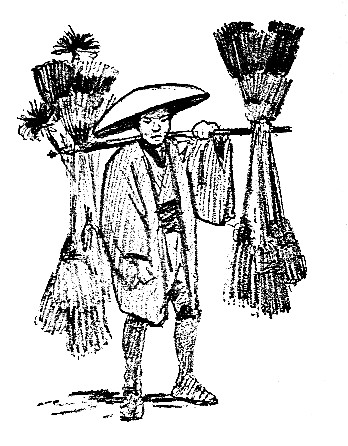
III HOW THEY WENT TO THE TEMPLE 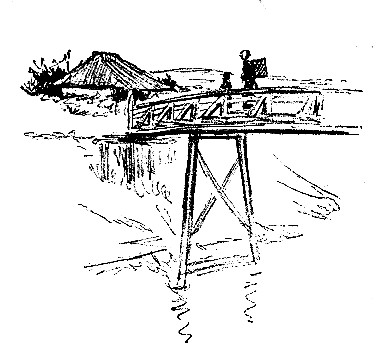
THE Twins were just stepping into their clogs when the front gate opened, and what do you think they saw! In came trotting three brown men, each one pulling a little carriage behind him! They came right up to the porch. Take was just standing on one foot, ready to slip her other one into the strap of her clog, when they came in. She was so surprised she fell right over backward! She picked herself up again quickly, and hopped along, with one shoe on and one shoe off. "Are we going to ride?" she gasped. Her Father laughed. "Yes, little pop≠eyes," he said; "we are going to ride to the Temple, and you and Taro shall ride in one rickshaw all by yourselves." The name of these little carriages drawn by men instead of horses is "jinrickshas," but he called them "rickshaws" for short. The Twins were so happy they could hardly keep still. They looked at all three rickshaws and all three men, and then they said to their Father:≠- "May we ride in this one?" It had red wheels. "Yes, you may ride in that one," he said. Then he got into the one with green wheels, and rode away. Mother and Grannie and the Baby got into the next one, and their rickshaw man trotted away after Father, "Keep close behind us," the Mother called back to the Twins. They got into the rickshaw with the red wheels, and away they flew. The Twins had never been in a rick≠shaw alone before in all their lives. They sat up very straight, and held on tight be≠cause it bounced a good deal, and the rickshaw man could run very fast. 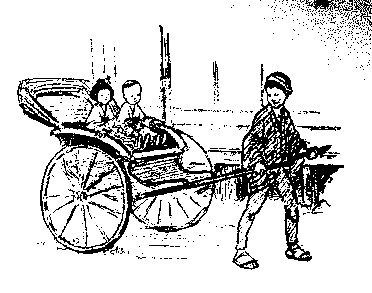
"I feel as grand as a princess," Take whispered to Taro. "How do you feel?" "I feel like a son of the Samurai," Taro whispered back. That was the proudest feeling he could think of. There were so very many interesting things to see that the Twins didn't talk much for a while. You see, it's hard work to use your mouth and your eyes and your ears all at once. So the Twins just used their eyes. It was still quite early in the morning when they reached the city streets. Here they saw men with baskets hung from poles going from house to house. Some were selling vegetables, some had fish, and others were selling flowers, or brooms. 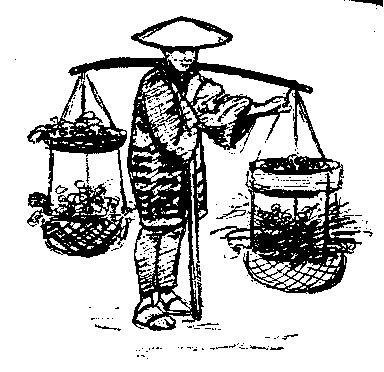
They saw little girls with baby brothers on their backs, skipping rope or bouncing balls. The baby's head wobbled dreadfully when his little sister skipped, but he didn't cry about it. He just let it wobble! 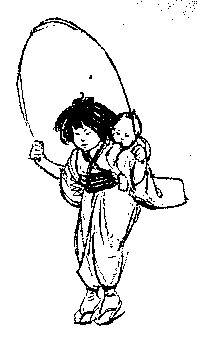
The Twins rode by fruit-shops, and cloth≠ing-shops with gay kimonos flapping in the breeze; by little shops where people were making paper lanterns, by tea-shops and silk-shops, by houses and gardens in strange places they had never seen be≠fore. They saw an old priest going from door to door, holding out his bowl for money. In one street carpenters were putting up a new house, and once they caught a glimpse of the very bridge that leads to the Emperor's palace. 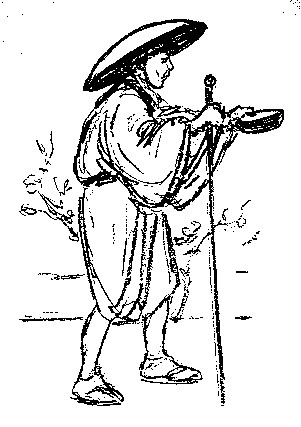
By and by they reached the gate of the Temple grounds. All the rickshaws stopped here, and everybody got out. The Mother put BōtíChan on her back, and they all started in a procession for the Temple. First walked the Father, looking very proud. Then came the Twins, looking quite proud, too. Then came Mother and Grannie and BōtíChan, and they looked proudest of all! When they got inside the gate, the Twins thought they were in fairyland. You would have thought so, too, if you could have been there with them. They saw so many wonderful things that day that if I were to tell you about every one of them it would fill up this whole book! First of all, they carne into a broad road≠way with beautiful great cedar trees on each side. Under these trees were little booths. Great paper lanterns and banners of all col≠ors hung in front of the booths; and when they waved gayly in the wind, the place looked like a giant flower-garden in full bloom. Near the Temple entrance was a great stone trough full of clear water. There was a long-handled wooden dipper floating on it. 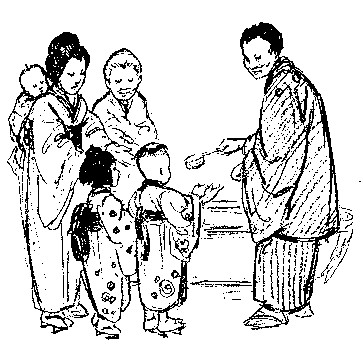
"Come here," said the Father. The Twins, Grandmother, and Mother, with Baby on her back, all came at once and stood in a row beside the trough. They put out their hands. The Father took the dipper and poured water on their hands. When their hands were quite clean, they rinsed their mouths, too. Then they entered the Temple vestibule. There were more little booths in the Temple vestibule, and there were so many people, big and little, crowding about that the Father took the Twins' hands so they wouldn't get lost. First he led them to a place where they bought some cooked peas on a little plate, and some rice. He gave the peas to Taro and some of the rice to Take. The Twins wondered what in the world their Father wanted with peas and rice. They soon found out. In the very next place was a little stall, and in the little stall was a tiny, tiny white horse -- no bigger than a big dog! Even its eyes were white. "Oh, Father," the Twins said, both to≠gether, "whose little horse is it?" "It's Kwannon's little horse," the Father said. "Taro, you may give him the peas" Taro held out the plate. The little white pony put his nose in the plate and ate them all up! He sniffed up Taro's sleeve as if he wanted more. Take patted his back. "Who is Kwan≠non?" she asked. "Kwannon is a beautiful goddess who loves little children," said the Father. "Does she live here?" asked Taro. "This is her Temple, where people come to worship," the Father answered. "We are going to pray to her to-day to take good care of BōtíChan always." "Did you ask her to take care of us, too?" asked Take. "Yes; we brought you both here when you were a month old, just as we are bringing BōtíChan now," the Father re≠plied. "Does she take care of all little chil≠dren?" Take said. "She loves them all, and takes care of all who ask for her protection." "My!" said Take. "She must have her hands full with such a large family!" Her Father laughed. " But, you see, she has a great many hands," he said. "If she had only two, like us, it would be hard for her to take care of so many." "I never saw her take care of me," said Taro. "We do not see the gods," their Father answered. "But we must worship and obey them just the same." "I think Kwannon must love little child≠ren," said Take, "because she wants them to have such good times in her Temple." They said good-bye to the little horse, and walked through an opening into a courtyard beyond. The moment they stepped into the courtyard a flock of white pigeons flew down and settled all about them. "Take may feed the pigeons," the Father said. "They are Kwannon's pigeons." Take threw her rice on the ground. The pigeons picked it all up. So many people fed them that they were almost too fat to fly! 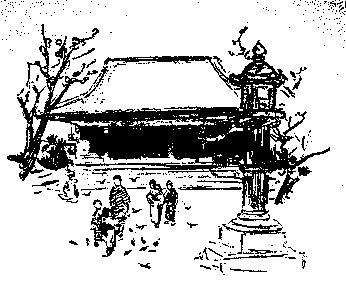
At another booth their Father bought some little rings of perfumed incense. He put them in his sleeve. His sleeves could hold more things than all a boy's pockets put together! When they reached the great door of the Temple itself, the Father said: "Now, we must take off our shoes." So they all slipped their toes out of their clogs, and went into the Temple just as the bell in the courtyard rang out with a great -- boom -- BOOM -- BOOM! that made the air shiver and shake all about them. The Temple was one big, shadowy room, with tall red columns all about. "It's just like a great forest full of trees, isn't it?" Taro whispered to Take, as they went in. "It almost scares me," Take whispered back; "it 's so big." Directly in front of the entrance there was another bell. A long red streamer hung from its clapper, and under it was a great box with bars over the top. On the box there perched a great white rooster! The Father pulled the red streamer and rang the bell. Then he threw a piece of money into the box. It fell with a great noise. "Cock-a-doodle-doo," crowed the rooster! He seemed very much pleased about the money, though it was meant for the priests and not for him. "The rooster is saying thank you," cried Take. "Hush," said her Mother. Then the Father drew from his sleeve a little rosary of beads. He placed it over his hands, and bowed his head in prayer while Grannie and Mother and Baby and the Twins stood near him and kept very still. When he had finished, a priest came up. 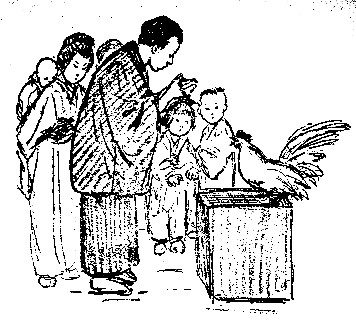
The Father bowed to the priest. "Will you show us the way to the shrine of Kwan≠non?" he asked. Away off at the farther end of the Tem≠ple, the Twins could see a great altar. Banners and lanterns hung about it, and people were kneeling on the floor before it, praying. Before the altar was an open brazier with incense burning in it. "Come this way," said the priest. He led them to the altar. The Father took BōtíChan from his Mother, and held him in his arms. The priest said a prayer to Kwannon, and blessed the Baby. Then the Father threw incense rings on the little fire that burned in the brazier before the altar. Wreaths of smoke began to curl about their heads. The air was filled with the sweet odor of it. Some of it went up BōtíChan's nose. It smarted. BōtíChan didn't like it. He had behaved beautifully up to that time, and I am sure if the incense hadn't gone up his nose he would have kept on behaving beautifully. But it did, and BōtíChan sneezed just as the priest finished the prayer. Then he gave a great scream. Then an≠other, and another. Three of them! The priest smiled. But the Father didn't smile. He gave BōtíChan back to his Mother just as quickly as he could. He said, "The honorable worshippers will be disturbed. We must go out at once." They hurried back to the entrance and found their clogs, and the moment they were outdoors again, in the sweet, fresh air, BōtíChan cuddled down on his Mother's back and went to sleep without another sound. Near the Temple they found an orchard of cherry trees in full bloom. People were sitting under the cherry trees, looking at the blossoms. Some of them were writing little verses, which they hung on the branches of the trees. They did this because they loved the blossoms so much. Children were playing all about. Near by was a pretty little tea-house. Grannie saw it first. "I am thirsty," she said. "So am I," said Take. "So am I," said Taro. "We're all thirsty," the Father said. Outside the tea-house, under the trees there were wooden benches. They sat down on these, and soon little maids from the tea-house brought them trays with tea and sweet rice-cakes. 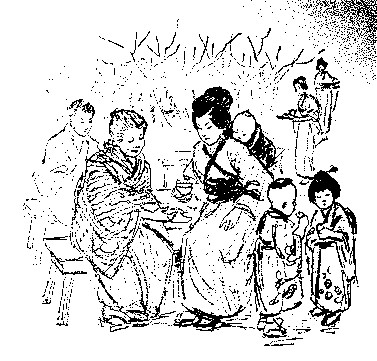
They sat on the benches and sipped their tea, and watched the people moving about, and looked up at the cherry blos≠soms against the blue sky, and were very happy, indeed. The Mother had carried BōtíChan all the way on her back, so maybe she was a little tired. Anyway, she said to the Father : "If you and the Twins want to go farther, let Grannie and me stay here and rest. You can come back for us." ''Would you like to see the animals?" the Father asked the Twins. Taro and Take jumped right up, and took their Father's hands, one on each side, and then they all walked away together under the blossoming trees to another part of the park. In this part of the park there were cages, and in the cages were lions, and tigers, and monkeys, and zebras, and elephants, and all kinds of animals! There were birds, too, with red and blue plumage and beautiful golden tails. There were parrots and cocka≠toos and pheasants. Wild ducks were swim≠ming in the ponds; and two swans sailed, like lovely white ships, to the place where the Twins stood, and opened their bills to be fed. In the Father's sleeve was something for each one. Taro and Take took turns. Take fed the swans, and Taro fed the great fish that swam up beside them and looked at them with round eyes. When they saw the food the fish leaped in the water and fought each other to get it, and when they ate it they made curious noises like pigs. 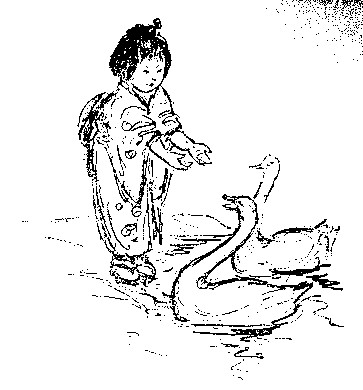
"I don't think they have very good man≠ners," said Take. By and by they came to a queer little street. This little street must have been made on purpose for little boys and girls to have fun in, for there were all sorts of as≠tonishing things there. There were jugglers doing strange tricks with tops and swords. There were acrobats, and candy-sellers and toy-sellers going about with baskets hung from long poles over their shoulders. It was almost like a circus. The street was full of people, and every one was gay. The Twins and their Father had gone only a little way up the street when an old woman met them. She had a pole on her shoulder, and from it swung a little fire of coals in a brazier. She had a little pot of batter and a little jar of sweet sauce, a ladle, a griddle, and a cake-turner! "Would you like to make some cakes?" she said to Take. Take clasped her hands. "Oh, Father, may I?" she said. The Father gave the old woman some money out of his sleeve. She set the brazier on the ground. 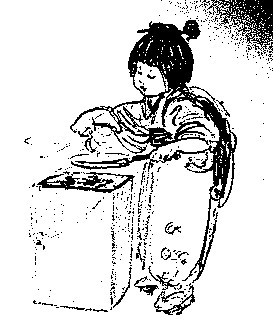
Then Take tucked her sleeves back, put the griddle on the coals, poured out some batter, and cooked a little cake on one side until it was brown. Then she turned it over with the cake-turner, and browned it on the other side. Then she put it on a plate and put the sauce on it. My, my! but it was fun! The first cake she made she gave to her Father. He ate it all up. Then he said, "Honor≠able daughter, the cake is the very best I ever had of the kind. I am sure your hon≠orable brother would like one too." The Japanese are so very polite that they often call each other "honorable" in that way. They even call things that they use "honorable," too! So Take said very politely, "Honorable Brother, would you like one of my poor cakes?" It would be impolite in Japan to call any≠thing good that you had made yourself. It would seem like praising your own work. That was why Take called them "my poor cakes." "I should like a cake very much," Taro said. Take poured out the batter. She watched it carefully, to be sure it did not burn. When it was just brown enough she gave it to Taro. Taro ate it all up. Then he said to Take, "Honorable Sister, I should like to eat six." 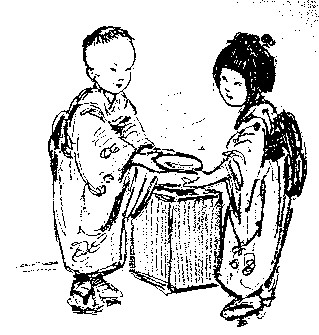
The Father laughed. "If you stay here to eat six cakes, we shall not see the dolls' garden," he said. "Take must have one cake for herself, and then we will go on." Take baked a cake for herself and ate it. She called it a "poor" cake aloud, but in≠side she thought it was the very best cake that any one ever made! When she had finished, she and Taro and the Father bowed politely to the old woman. "Sayonara," they said. That means "good-bye." The old woman bowed. "Sayonara," she called to them. The Twins and their Father walked on. They soon found the dolls' garden. In it were many tiny pine trees like theirs at home. There were little plum trees, and bamboos, and a tiny tea-house in it. There was a pond with a little bridge, too. 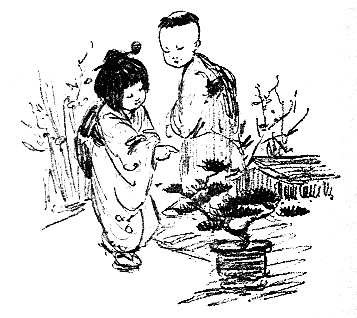
"Oh!" cried Take, "if it only had little bells on the plum trees, this would be the very garden I sang about to BōtíChan; wouldn't it?" She stooped down and peeped under the little trees. "Let 's play we are giants!" she said to Taro. "Giants roar," said Taro. "You roar," said Take. "It wouldn't be polite for a lady giant to roar!" "Giants are different. They don't have to be polite," Taro explained. "Well, you can roar," said Take, "but I shall play I'm a polite lady giant taking a walk in my garden! My head is in the clouds, and every step I take is a mile long!" She picked up her kimono. She turned her little nose up to the sky, and took a very long step. Taro came roaring after her. But just that minute Take's clog turned on her foot, and the first thing she knew she was flat on her stomach on the bridge! She forgot that lady giants didn't roar. Taro was roaring already. Their Father was ahead of them. He jumped right up in the air when he heard the noise. He wasn't used to such sounds from the Twins. He turned back. "What is the matter?" he said. He picked Take up and set her on her feet. "We're giants," sobbed Take. "Her head was in the clouds," said Taro. "It is well even for giants to keep an eye on the earth when they are out walk≠ing," the Father said. "Are you hurt?" "Yes, I'm hurt," Take said; "but I don't think I'm broken anywhere." "Giants don't break easily at all," her Father answered. "I think you'll be all right if we go to your castle!" "My castle!" cried Take. "Where is it?" "Right over there through the trees." He pointed to it. The Twins looked. They saw a high tower. 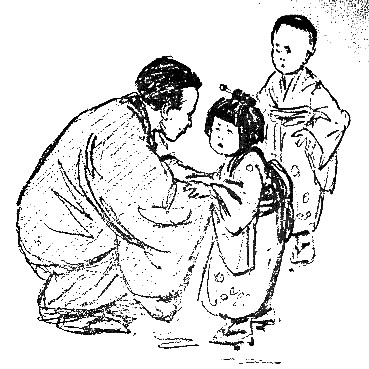
"Would you like to climb to the top with me?" their Father said. "Oh, yes," Taro cried. "We aren't tired." "Or broken," Take added. So they went into the tower and climbed, and climbed, and climbed. It seemed as if the dark stairs would never end. "I believe the tower reaches clear to the sky!" said Take. "I don't believe it has any top at all!" said Taro. But just that minute they came out on an open platform, and what a sight they saw! The whole city was spread out be≠fore them. They could see gray roofs, and green trees, and roadways with people on them. The people looked about as big as ants crawling along. They could see rivers, and blue ponds, and canals. It seemed to the Twins that they could see the whole world. In a minute the Father said, "Look! Look over there against the sky!" The Twins looked. Far away they saw a great lonely mountain-peak. It was very high, and very pale against the pale blue sky. The top of it was rosy, as if the sun shone on it. The shadows were blue. Below the top there were clouds and mists. The mountain seemed to rise out of them and float in the air. The Twins clasped their hands. 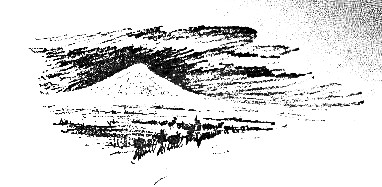
"It is Fuji!" they cried, both together. "Yes," said the Father. "It is Fuji, the most beautiful mountain in the world." By and by Take said, "I don't feel a bit like a giant any more." And Taro said, "Neither do I." For a long time they stood looking at it. Then they turned and crept quietly down the dark stairs, holding tight to their Fa≠ther's hands. They went back to Mother and Grand≠mother and BōtíChan under the cherry trees. "We must take the Baby home," said the Mother as soon as she saw them. "It's growing late." "Oh, mayn't we stay just a little longer?" Take begged. "Please," said Taro. "If we go now, we can go home by boat," said the Father. 
"I didn't believe a single other nice thing could happen this day," sighed Take. "But going home by boat will be nicer than stay≠ing. Won't it, Taro?" But Taro was already on his way to the landing. There was a pleasure-boat tied to the wharf. The whole family got on board; the boatman pushed off and away they went over the blue waters and into the river, and down the river a long way, through the city and beyond. They passed rice-fields, where men and women in great round hats worked by standing ankle deep in water. There were fields where tea-plants were growing. There were little brown thatched roofs peeping out from under green trees. There were glimpses of little streets in tiny villages, and of people riding in a queer sort of basket hung from a pole and carried on the shoulders of two men. 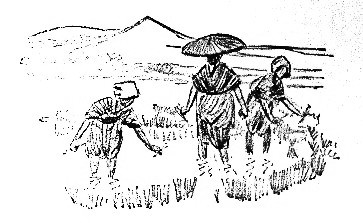
At last they came to a landing-place near their home. They were glad to see the familiar roofs again. 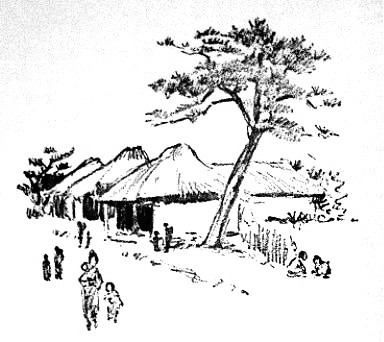
Taro and Take raced ahead of the others to their own little house in the garden. At the door they found ever so many clogs. There were sounds of talking inside the house. "What do you suppose is going to hap≠pen now?" Take asked Taro. "I don't know -- but something nice," Taro answered, as he slipped off his clogs and sprang up on the porch. They slid open the door. "Ohayo!" came a chorus of voices. The room was full of their aunts and cousins! Taro and Take were very much surprised, but they remembered their manners. They dropped on their knees and bowed their heads to the floor. 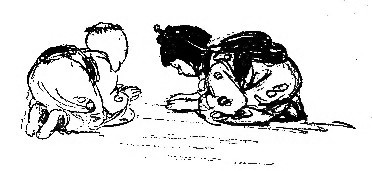
"Where are your Father and Mother, and Grannie and BōtíChan?" said all the aunts and cousins. "They are late." "We came back by the boat, and it stopped at ever so many places," said Taro. "That's why we are late." Soon their Father and Mother and Grandmother came in. Then there was great laughing and talking, and many po≠lite bows. BōtíChan was passed from one to another. Everybody said he was the finest baby ever seen, and that he looked like his Father! And his Mother! and his Grandmother! Some even said he looked like the Twins! Everybody brought presents to the baby. There were toys, and rice, and candied peas and beans, and little cakes, and silk for dresses for him, and more silk for more dresses, and best of all a beautiful puppy cat. Here is his picture! The Twins thought BōtíChan could never use all the things that were given him but they thought they could help cut up the candied things. 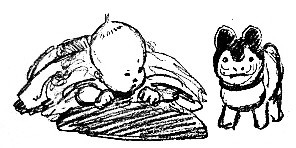
BōtíChan seemed to like his party. He sucked his thumb and looked solemnly at the aunts and cousins. He even tried to put the puppy cat in his mouth. Natsu took him away at last and put him to bed. Then everybody had tea and good things to eat until it was time to go home. 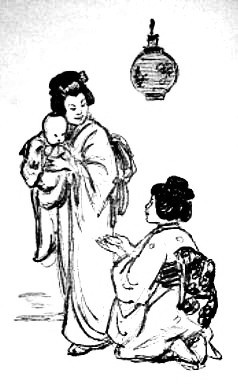
It took the Twins a long time to get to sleep that night. Just as she was cuddling down under her warm, soft mats, Take popped her head out once more and looked across the room to Taro's bed. "Taro!" she whispered. Taro stuck his head out, too. She could see him by the soft light of the candle in the tall paper lamp beside his bed. "Don't you think it's about a week since morning?" she said. "So many nice things have happened to-day!" "There never could be a nicer day than this," said Taro. "What was the nicest of all?" Take asked. "I'll tell you what I liked the best if you'll tell me." Then Taro told which part of the day he liked the best, and Take told which she liked the best. But I'm not going to tell whether they said the little horse, or the tiny garden, or the cherry trees, or the ani≠mals, or the boat-ride -- or the party. You can just guess for yourself! 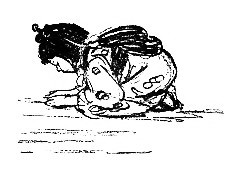 |